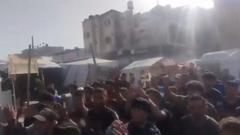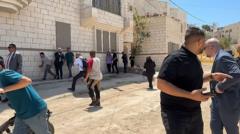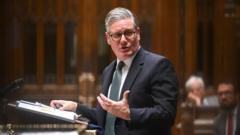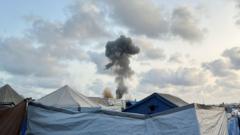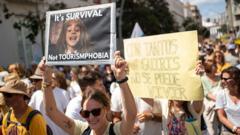As Israel's military campaign in Gaza intensifies, a notable segment of the Israeli public is increasingly voicing discontent regarding the conduct of the war, signaling a potential shift in attitudes towards the government's approach and its humanitarian consequences.
Growing Dissent in Israel Over Gaza Offensive as Public Opinion Shifts

Growing Dissent in Israel Over Gaza Offensive as Public Opinion Shifts
Increasing opposition among Israeli citizens emerges over the ongoing military actions in Gaza, with many calling for a ceasefire and expressing concerns for hostages and civilians.
As Israel's conflict in Gaza escalates, a notable wave of dissent is surfacing among the Israeli populace regarding the government's military strategies. High-profile figures, including Yair Golan, a former deputy commander of the Israel Defense Forces (IDF), have condemned the government’s actions, suggesting that Israel risks becoming an international pariah unless it alters its current trajectory. Golan’s remarks, stating that the state must not engage in violent campaigns against civilians, have met with fierce backlash, with Prime Minister Benjamin Netanyahu labeling them as slanderous.
Compounding this sentiment, Moshe "Bogi" Ya’alon, a former defense minister, criticized the ongoing military operations, asserting they reflect a broader governmental policy aimed at bolstering power rather than achieving peace, which he believes is leading the nation toward ruin. Despite initial domestic support following the October 7 attacks by Hamas, which resulted in significant casualties and hostage situations, public opinion is beginning to tilt, as recent polls indicate over 60% of Israelis now favor concluding the conflict and prioritizing the safe return of hostages rather than expanding military efforts.
The war's humanitarian toll has prompted protests, including a significant demonstration involving 500 activists asking for a ceasefire while highlighting the tragedy faced by Palestinian civilians, notably children. This grassroots movement, spearheaded by the anti-war coalition Standing Together, is gaining traction, reflecting a shift in Israeli sentiments. Alon-Lee Green, the group's leader, emphasized the awakening consciousness within the public as dissent continues to grow.
Reserve soldiers have also added to the call for political change by urging the government to pivot from military aggression toward diplomatic negotiations aimed at restoring hostages to their families. Mariyeh Abed, a participant in the protests, shared a poignant belief that an unwavering military approach not only endangers civilians but also jeopardizes the lives of hostages and Israeli soldiers.
Conversely, not all Israelis feel the same urgency for a ceasefire. Reports include contrasting opinions, such as those from protesters at the Kerem Shalom crossing who express a belief in the culpability of Palestinians in their choice of leadership. Furthermore, international reactions to the ongoing offensive have escalated, with the UK introducing sanctions, halting trade discussions, and expressing moral condemnation of Israel's actions.
As diplomatic pressure mounts, enhanced scrutiny over Israel's policies appears imminent, leading many to predict a potential transformation in public discourse regarding the Gaza conflict. Observers note the emerging winds of change and a growing demand for action, leaving the government's position increasingly tenuous as both internal and external pressures collide.

